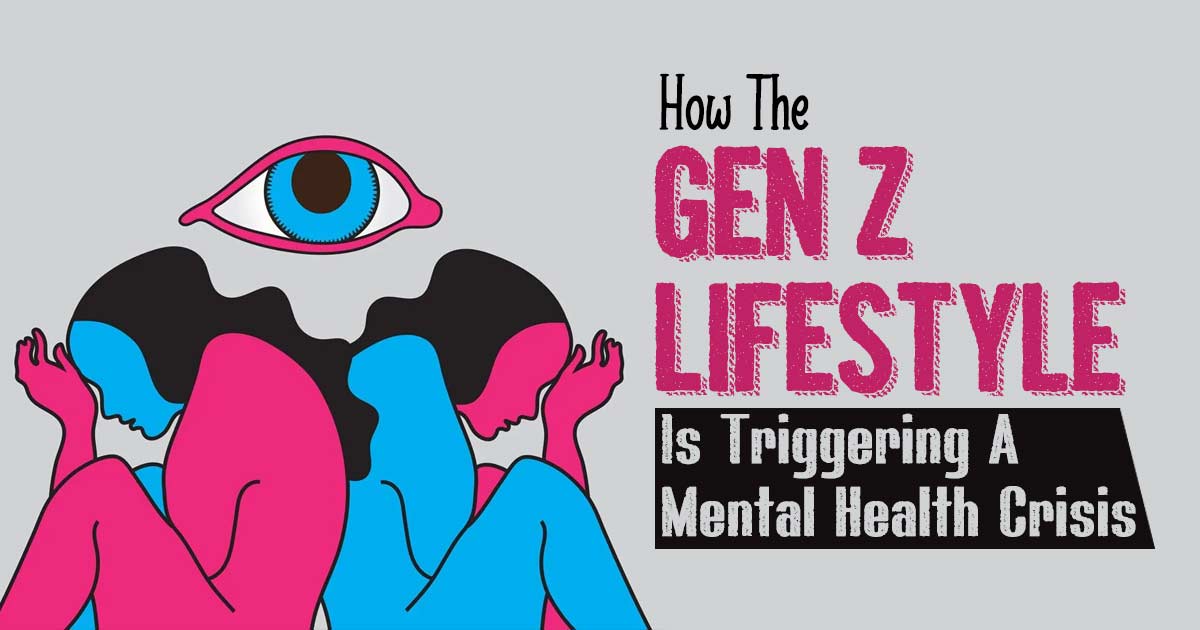Generation Z, born roughly between the mid-1990s and early 2010s, is growing up in an era defined by rapid technological advancements, unprecedented access to information, and evolving societal norms. While these factors have brought about numerous benefits, they have also contributed to a unique set of challenges for this generation, including GenZ lifestyle disorders and mental health issues.
What Are Lifestyle Disorders?
Lifestyle disorders, often referred to as non-communicable diseases, are health conditions primarily caused by unhealthy behaviors and choices. These include:
- Poor diet
- A lack of physical activity
- Smoking
- Excessive alcohol consumption
- Chronic personal and occupational stress
What Are Some Common GenZ Lifestyle Disorders?
Common GenZ lifestyle disorders include obesity, digital addiction, anxiety disorders, depression, eating disorders, sleep disorders, substance abuse, social isolation, and digital eye strain.
GenZ Lifestyle Disorders And Mental Health
GenZ lifestyle disorders and mental health are intricately related, as these disorders can trigger a range of mental health conditions like:
1. Increased Stress and Anxiety:
Academic pressure, peer comparisons on social media, and the fear of missing out can lead to chronic stress and anxiety disorders.
2. Depression and Suicidal Ideation:
The constant exposure to curated online lives and the prevalence of cyberbullying can contribute to depression and even suicidal thoughts among Gen Z individuals.
3. Negative Body Image:
The unrealistic beauty standards propagated on social media can lead to poor body image and low self-esteem, increasing the risk of eating disorders and depression.
4. Impaired Cognitive Function:
Sleep disorders, digital addiction, and substance abuse can all impair cognitive function, affecting academic and personal development.
5. Social Isolation:
Despite being highly connected online, Gen Z individuals can struggle with real-world social interactions, leading to feelings of isolation and loneliness.
Solutions And Strategies For Genz Lifestyle Disorders
Addressing the lifestyle disorders and mental health challenges faced by Gen Z requires a multifaceted approach:
- Digital Literacy Education: Schools and parents should focus on teaching digital literacy, including the responsible use of social media and technology. This can help Gen Z navigate the online world more safely.
- Mental Health Awareness: Initiatives that promote mental health awareness and reduce stigma should be implemented in schools and communities. Counseling services should be readily available for those in need.
- Balanced Screen Time: Encouraging a healthy balance between screen time and physical activity is crucial. Setting screen time limits and promoting outdoor activities can help combat digital addiction and sedentary lifestyles.
- Healthy Eating Habits: Promoting nutritious eating habits and educating Gen Z about the importance of a balanced diet can combat obesity and eating disorders.
- Stress Management: Teaching stress management techniques such as mindfulness, meditation, and time management can help Gen Z cope with academic and social pressures.
- Anti-Bullying Initiatives: Schools and online platforms should have robust anti-bullying measures in place to protect Gen Z from cyberbullying.
- Sleep Hygiene: Educating Gen Z about the importance of good sleep hygiene and the effects of screen time on sleep can help combat sleep disorders.
- Encouraging Face-to-Face Interaction: Promoting in-person social interactions and community involvement can help reduce social isolation.
- Parental Involvement: Parents play a crucial role in monitoring and guiding their children’s online activities and overall well-being. Open communication and understanding are key.
- Professional Support: Recognizing when professional support is necessary is crucial. Access to mental health services, therapists, and counselors should be available and destigmatized.
Generation Z faces a unique set of lifestyle disorders and mental health challenges due to the digital age they have grown up in. These challenges, including obesity, digital addiction, anxiety, depression, and more, can have profound and long-lasting effects on their well-being. However, with the right strategies and interventions, we can help Gen Z navigate these challenges and develop into healthier, happier individuals. It is essential for society, parents, educators, and healthcare professionals to work together to address these issues and provide the support and resources needed for the well-being of Generation Z.










